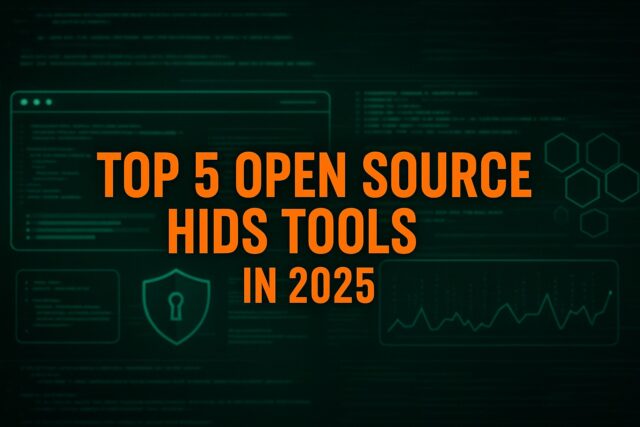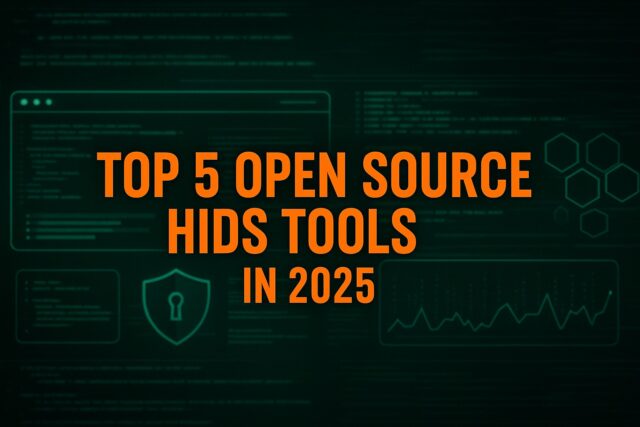With more businesses running Linux in production—whether in bare metal, VMs, or containers—the need for visibility at the host level has never been more urgent.

While EDR and XDR platforms dominate enterprise mindshare, open-source Host-based Intrusion Detection Systems (HIDS) remain essential in real-world deployments, especially where cost, auditability, or customizability matter.
This post breaks down the 5 best OSS HIDS tools for Linux in 2025, based on:
- Actual deployment maturity
- Active development
- Breadth of detection (file, process, behaviour, kernel)
- Container/K8s awareness
- Resource usage and signal-to-noise ratio
Why HIDS Still Matters in 2025
Host-level detection is often your last line of defence when:
- Network monitoring is blocked or evaded
- Logs are tampered with or missing
- The threat is insider-driven or lateral movement is already in progress
- Cloud providers only offer limited telemetry (e.g. EC2/VM metadata, not syscall data)
HIDS is also increasingly used in:
- Compliance frameworks (e.g. PCI DSS, HIPAA, ISO 27001)
- Linux-based SOC pipelines
- Container and edge security deployments
Top 5 Open Source HIDS Tools in 2025
Here’s the current landscape based on GitHub activity, community usage, and known deployments in production.
🥇 1. Wazuh – Best Overall OSS HIDS (for compliance-heavy environments)
GitHub: wazuh/wazuh
License: GPLv2
Latest Release: v4.7.3 (May 2025)
✅ Integrated file integrity monitoring (FIM), log analysis, rootkit detection
✅ Powerful rules engine + active response
✅ Web UI + Elastic Stack support
✅ Kubernetes-aware with container runtime events
✅ Built-in PCI/GDPR/HIPAA policy checks
Use If: You need audit-ready compliance tooling and scalable enterprise deployments.
🥈 2. Elkeid – Most Scalable for Cloud-Native Infra
GitHub: bytedance/Elkeid
License: Apache 2.0
Latest Release: v1.10.2 (March 2025)
✅ Built by ByteDance for massive-scale eBPF-based host telemetry
✅ Kafka-backed detector pipeline
✅ Plugin-based rule engine in Go/Lua
✅ Container-native with eBPF and netlink-based visibility
✅ Highly performant on modern Linux kernels
Use If: You want cloud-scale HIDS for containerised workloads and distributed infra.
→ Read full Elkeid write-up here
🥉 3. Falco – Best for Runtime Container Threat Detection
GitHub: falcosecurity/falco
License: Apache 2.0
Latest Release: v0.40.0 (Feb 2025)
✅ CNCF sandbox project
✅ Real-time syscall monitoring via eBPF
✅ Built-in rules for K8s-specific threats (e.g., shell in container, modified binaries)
✅ Lightweight and fast, can export to Prometheus/SIEMs
✅ Plugins for CRI-O, containerd, pod security policies
Use If: You want a fast, container-native runtime detection engine.
4. OSSEC – Classic, Still Functional, But Aging
GitHub: ossec/ossec-hids
License: GPLv3
Latest Release: v3.7.0 (2023)
✅ Log-based detection with decent FIM support
✅ Syslog integration, rule tuning possible
✅ Stable and works in legacy environments
✅ Minimal resource usage
⚠️ Lacks native support for modern workloads, no container awareness
⚠️ Less active development compared to Wazuh or Elkeid
Use If: You need a low-footprint HIDS for legacy, static, or resource-constrained systems.
5. AuditD + AIDE – Custom Lightweight Stack for DIY Ops
GitHub:
✅ Extremely lightweight
✅ Works well on hardened systems and low-resource devices
✅ Used in high-assurance environments (NSA/CIS benchmarks)
⚠️ Not a turnkey HIDS solution—requires configuration, scripting, and log management
⚠️ No alerting, dashboard, or enrichment without building a pipeline
Use If: You want complete control over what gets monitored, logged, and how it gets handled.
Comparison
| Tool | Container Aware | eBPF Support | FIM | Alerting | Scalable | UI / Dashboard |
|---|---|---|---|---|---|---|
| Wazuh | ✅ | ❌ | ✅ | ✅ | ✅ | ✅ |
| Elkeid | ✅ | ✅ | ✅ | ✅ | ✅ | ✅ |
| Falco | ✅ | ✅ | ❌ | ✅ | ✅ | ❌ (CLI only) |
| OSSEC | ❌ | ❌ | ✅ | ✅ | ⚠️ | ❌ |
| AuditD + AIDE | ⚠️ | ⚠️ | ✅ | ❌ | ✅ | ❌ |
Final Thoughts
In 2025, open-source HIDS tools are alive and thriving, especially for teams that care about auditability, cloud-native visibility, or budget-conscious deployments.
- Use Wazuh for full-featured compliance and enterprise security.
- Choose Elkeid if you’re running multi-region cloud Linux workloads.
- Add Falco to any container pipeline where runtime visibility matters.
- Keep OSSEC or AuditD around for legacy or hardened static workloads.
The best part? These tools are free, actively maintained, and battle-tested—often outperforming their commercial counterparts in transparency and flexibility.
